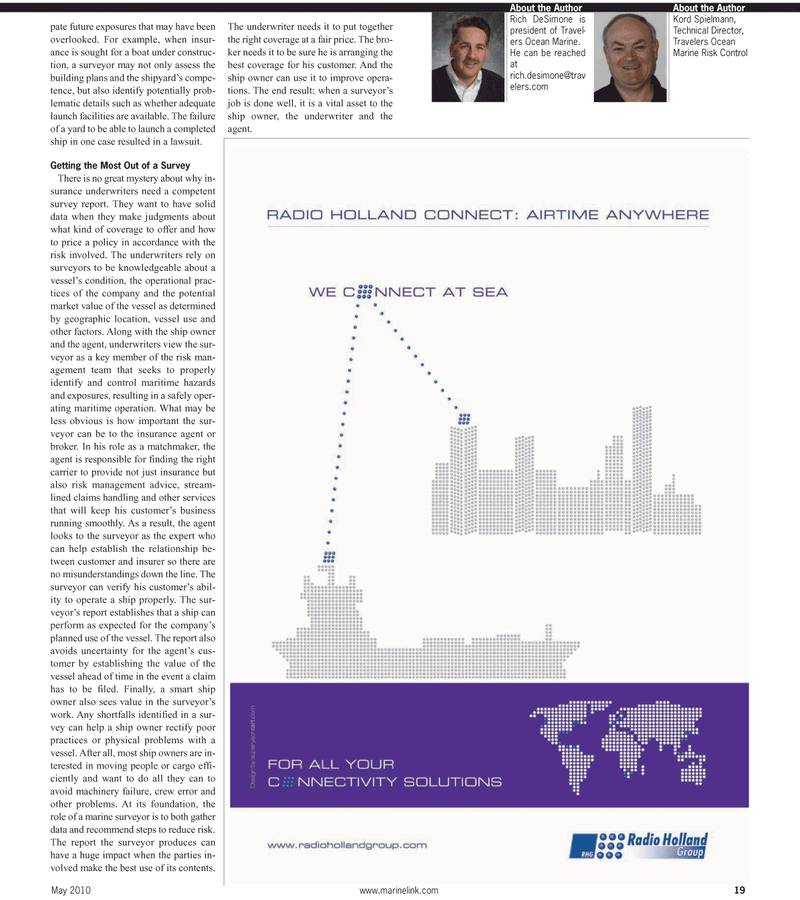
Page 19: of Maritime Reporter Magazine (May 2, 2010)
Read this page in Pdf, Flash or Html5 edition of May 2, 2010 Maritime Reporter Magazine
pate future exposures that may have been overlooked. For example, when insur- ance is sought for a boat under construc- tion, a surveyor may not only assess the building plans and the shipyard’s compe- tence, but also identify potentially prob- lematic details such as whether adequate launch facilities are available. The failure of a yard to be able to launch a completed ship in one case resulted in a lawsuit.
Getting the Most Out of a Survey
There is no great mystery about why in- surance underwriters need a competent survey report. They want to have solid data when they make judgments about what kind of coverage to offer and how to price a policy in accordance with the risk involved. The underwriters rely on surveyors to be knowledgeable about a vessel’s condition, the operational prac- tices of the company and the potential market value of the vessel as determined by geographic location, vessel use and other factors. Along with the ship owner and the agent, underwriters view the sur- veyor as a key member of the risk man- agement team that seeks to properly identify and control maritime hazards and exposures, resulting in a safely oper- ating maritime operation. What may be less obvious is how important the sur- veyor can be to the insurance agent or broker. In his role as a matchmaker, the agent is responsible for finding the right carrier to provide not just insurance but also risk management advice, stream- lined claims handling and other services that will keep his customer’s business running smoothly. As a result, the agent looks to the surveyor as the expert who can help establish the relationship be- tween customer and insurer so there are no misunderstandings down the line. The surveyor can verify his customer’s abil- ity to operate a ship properly. The sur- veyor’s report establishes that a ship can perform as expected for the company’s planned use of the vessel. The report also avoids uncertainty for the agent’s cus- tomer by establishing the value of the vessel ahead of time in the event a claim has to be filed. Finally, a smart ship owner also sees value in the surveyor’s work. Any shortfalls identified in a sur- vey can help a ship owner rectify poor practices or physical problems with a vessel. After all, most ship owners are in- terested in moving people or cargo effi- ciently and want to do all they can to avoid machinery failure, crew error and other problems. At its foundation, the role of a marine surveyor is to both gather data and recommend steps to reduce risk.
The report the surveyor produces can have a huge impact when the parties in- volved make the best use of its contents.
The underwriter needs it to put together the right coverage at a fair price. The bro- ker needs it to be sure he is arranging the best coverage for his customer. And the ship owner can use it to improve opera- tions. The end result: when a surveyor’s job is done well, it is a vital asset to the ship owner, the underwriter and the agent.
May 2010 www.marinelink.com 19
About the Author
Kord Spielmann,
Technical Director,
Travelers Ocean
Marine Risk Control
About the Author
Rich DeSimone is president of Travel- ers Ocean Marine.
He can be reached at rich.desimone@trav elers.com

 18
18

 20
20
